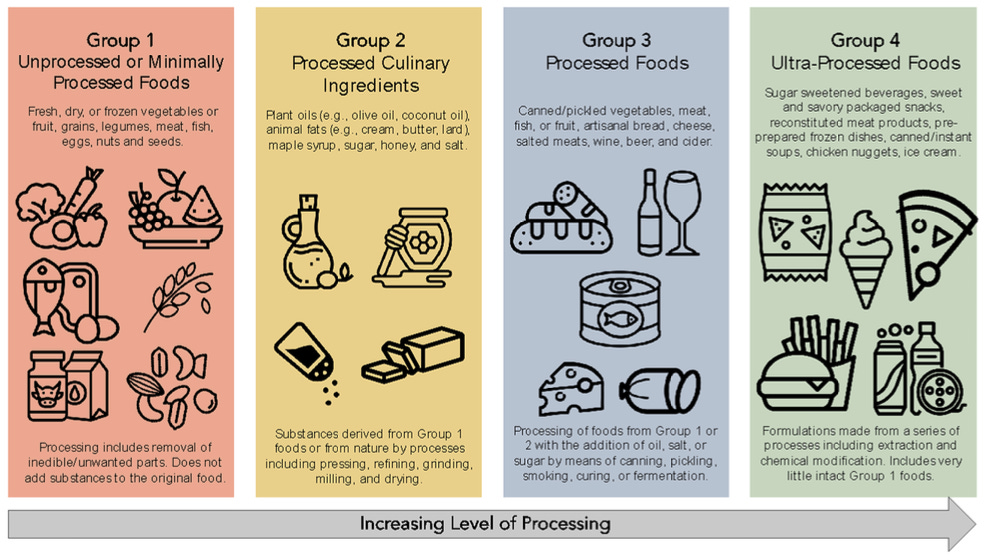Before we get into Rule #2, let’s quickly review rule #1: Avoid eating animal products. If the food you are about to eat had eyeballs or came from something with eyeballs, try to avoid it. but that does not mean that you can just eat anything labeled “plant-based” or “vegan”.
This leads me to Rule Number 2: Avoid ultra-processed foods
The way I like to define ultra-processed foods is a “food” that looks like it was highly manipulated by humans and basically not recognizable as a food in nature. An example of this would be Oreos. Although it is technically plant-based/vegan (does not have animal products), you sure as heck can't buy an Oreo tree from your local garden! Oreos are NOT natural. Just because something is “plant-based” does not mean it is a health food.
Why is this a big deal? In the Standard American Diet (SAD), about 57% of the calories consumed come from ultra processed foods. These are literally man-made foods! Let me say that again, 57% of the food that we eat as Americans are not even natural! No wonder we suffer from so many chronic inflammatory conditions nowadays.
When I give lectures, patients and other doctors will ask me what is the definition of processed vs ultra processed. This can be confusing, because there are many levels of processing, from unprocessed —> minimally processed —> ultra processed.
In general, I try to think about whether or not that food is something I would have been able to make at home. Minimally processed foods generally involves cleaning, cutting, freezing, and drying. Examples include: chopping up broccoli, cooking your beans, making a smoothie, etc. The key thing about minimally processed foods is that the end product keeps most if not all of its nutritional value.

Minimally processed foods are ok, but I draw the line when it is ultra processed. Ultra processed is usually a food that you probably can’t make at home and goes through multiple complicated steps before we have the end product. Fiber and naturally occuring vitamins and nutrients are often lost in the process, making the food less beneficial. Then companies add refined sugar, unhealthy fats, salt, artificial flavors, and preservatives to enhance the flavor and texture of foods. An example of this would be protein bars or protein shakes. Whether it be vegan or not, protein is extracted from pea, milk, or soy, turned into a powder and mixed with nuts, sweeteners and other fats. While this may look like a healthy food, it’s missing all the antioxidants, vitamins, and fiber that the original pea or soybean had to offer.
This is a video ( Why We Can't Stop Eating Certain Foods - BBC) that I share with my patients at the end of each group consult. It shows how confusing it can be to navigate eating healthy foods. When I watched it, it made me so mad and I wished more doctors would stop blaming their patients and genetics for their health conditions. This video is why I want patients to change their diets and STICK IT TO THE MAN! These food companies don't deserve your money and you don't need to pay with your health.
So, what can I eat? Ask yourself if the food you are about to eat grew from the ground like this? Can you recognize that plant, fruit, or vegetable? If the answer is yes, then please go on and eat as much of it as you want.
Trust Mother Nature. She’s got your back and has provided about 300,000 edible plants for us. We land in trouble is when we mess too much with her, that’s when she is sits back and says, “OK, let’s see what happens when you manipulate my food.”
In the end, I want you to respect your body by choosing food that looks like it grew from the ground and aim to do this 80-90% of the time. The other 10-20%, it is ok to celebrate. Go, reclaim your health and be well!
Got questions and curiosities? Let’s explore them! Or simply share positive experiences with other members of our community.
Thanks for reading Regina’s Substack! Subscribe for FREE to receive new posts and support my work.




Hi Dr. Ragasa, I wanted to ask, as far as making your own version of items that are usually processed, how does that fit with this lifestyle? For example, I made whole wheat waffles and substituted bananas and blueberries for the oil/eggs & sugar but used a milk alternative to finish the recipe. The milk alternative “seemed” to be minimally processed (almonds & water) but would this then make the recipe something not to make?